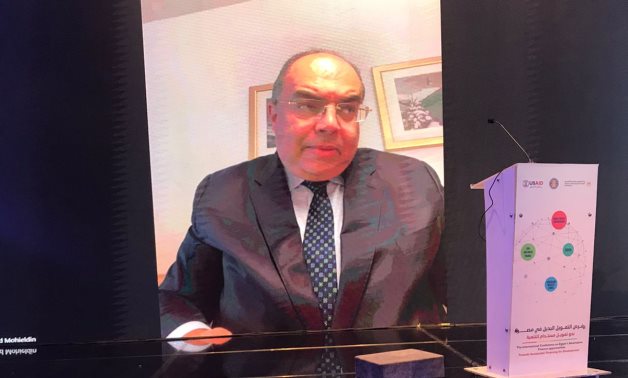
COP27 Climate Champion, IMF Executive Director and UN Special Envoy on Financing the 2030 Agenda Mahmoud Mohieeldin attending virtually a conference held by Egypt on May 23, 2022. Egypt Today/Noha El Tawil
CAIRO - 23 May 2022: “Not fair that my rich neighbor pollutes the environment and I endure debts to achieve mitigation and adaptation...They (old and new industrial countries) must pay back in the form of investments in green economy (in Africa) instead of pushing those countries to become more indebted,” COP27 Climate Champion Mahmoud Mohieeldin said Sunday.
Mohieldin made the statements while virtually attending an event held by the Ministry of Planning and Economic Development on alternative financing to sustainable development.
The COP27 Climate Champion pointed out that Africa’s contribution in emissions is just 3-4%. On the other hand, speaking of the shares of some G20 member states, those of China, United States, and Russia are 30%, 14%, and 4%, respectively.
Nevertheless, Impact on the continent is the most severe in the form of floods, drought, and malnutrition among others, Mohieldin said.
In another context, the renown economist, who is also the IMF executive director and the UN Special Envoy on Financing the 2030 Agenda,tackled the current global crisis the world is enduring saying that capital is in regress, and channels between countries are being blocked.
The international official urged facilitating global trade by eliminating the obstructions facing global supply chains, especially those pertaining to staples and food.
“Otherwise, stagflation will keep rising,” Mohieldin warned, also lamenting that inflation engendered raising interest rates, which in turn, made many countries fall in the trap of debt.
In that context, Mohieldin pointed out to the G20 Debt Service Suspension Initiative (DSSI) as a step forward to alleviate the debt crisis, stating that the developing countries that applied until present to benefit from the program are Ethiopia, Zambia, Chad and Sri Lanka. Nevertheless, Mohieldin says that the structure and framework of handling debts are still incomplete.
The high-profile economist also raised the issue of the increase of transactions fees to 6.3.% by international payment methods, saying that the costs are almost nothing so the move is considered exploitation of the crisis.
As for securing funding amid such global downturn, Mohieldin said, “Instead of resorting to out the box funding, first, exhaust the traditional funding methods existing inside the box.”
With regard to the aspects of expenditure of such funding, the IMF executive director stipulated, “Invest in resilience by empowering people... Raise growth rates and employment rates.” Speaking of trade deficit, Mohieldin stressed, “The challenge is not reducing imports. Rather, it’s boosting exports.”
The international official hailed the growth of Fintech is Egypt, asserting the necessity of promoting, in parallel, Thoughttech, which is how to deal with new technologies, among people.
The final recommendations by the prominent economist included turning assets into monetary flows, and mobilizing local financial resources.

Comments
Leave a Comment